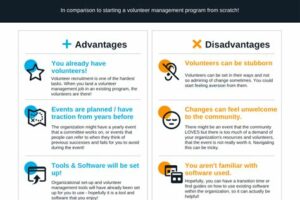Table of Contents
Discover meaningful volunteer opportunities in special education programs. Engage with children and adults with special needs, providing support, education, and empowerment. Make a positive impact by helping them develop essential skills, fostering inclusion, and advocating for their rights. Join a special education volunteer program today and contribute towards creating a more inclusive society.
Are you passionate about making a difference in the lives of children with special needs? Do you have a desire to give back to your community and make a positive impact? Look no further than Special Education Volunteer Programs! These programs offer a unique opportunity for individuals to contribute their time and skills to support students with disabilities. Whether you are a seasoned professional or just starting your career, these volunteer programs provide valuable hands-on experience and a chance to develop your knowledge in the field of special education. Furthermore, by participating in these programs, you will not only gain a deeper understanding of the challenges faced by individuals with special needs but also make lasting connections and create meaningful memories that will last a lifetime. So why wait? Join Special Education Volunteer Programs today and become part of a team dedicated to improving the lives of children with disabilities!
Introduction
Special education volunteer programs play a crucial role in supporting individuals with disabilities. These programs provide valuable resources and assistance to students, educators, and families, helping to create inclusive learning environments and promote equal opportunities for all. By volunteering in special education, individuals can make a significant impact on the lives of those with disabilities and contribute to building a more inclusive society.
The Importance of Special Education Volunteers
Special education volunteers bring unique skills, empathy, and dedication to the table. Their contributions help bridge the gap between limited resources and the diverse needs of students with disabilities. With their support, students can receive personalized attention, specialized instruction, and access to educational materials that cater to their individual needs. Volunteers also assist teachers in implementing effective strategies and interventions, enhancing the overall quality of education for students with disabilities.
Benefits of Volunteering in Special Education
Volunteering in special education offers numerous benefits, both personal and professional. It provides an opportunity to develop a deeper understanding of different disabilities and learn effective ways to support individuals with diverse needs. Volunteers gain valuable skills in communication, adaptability, problem-solving, and teamwork, which are highly transferable to various career paths. Moreover, volunteering in special education fosters a sense of fulfillment and purpose, as volunteers witness the positive impact they make in the lives of students and their families.
1. Personal Growth
Volunteering in special education allows individuals to grow personally by challenging their preconceived notions and biases about disabilities. It expands their awareness, empathy, and ability to appreciate the unique strengths and capabilities of individuals with disabilities.
2. Professional Development
Special education volunteer programs provide an excellent platform for individuals pursuing careers in education or related fields. Volunteers gain hands-on experience, allowing them to develop practical skills and knowledge that can enhance their resumes and future job prospects.
Special Education Volunteer Organizations
Various organizations offer volunteer opportunities in the field of special education. These organizations partner with schools, community centers, and other institutions to connect volunteers with individuals who require assistance. Some well-known special education volunteer organizations include Special Olympics, Best Buddies, Autism Speaks, and United Way.
1. Special Olympics
Special Olympics is a global organization that provides year-round sports training and athletic competitions for individuals with intellectual disabilities. Volunteers can support athletes during events, assist with coaching, and promote inclusive recreational activities within their communities.
2. Best Buddies
Best Buddies is an international nonprofit organization that promotes friendships, leadership development, and inclusive opportunities for individuals with intellectual and developmental disabilities. Volunteers can become mentors, organize social events, or participate in advocacy campaigns to raise awareness about inclusion.
3. Autism Speaks
Autism Speaks is a leading autism advocacy and research organization. Volunteers can engage in various activities, such as organizing fundraising events, participating in awareness campaigns, or providing support to families affected by autism.
4. United Way
United Way partners with local schools and organizations to offer volunteer opportunities in special education. Volunteers can provide tutoring, assist in classrooms, or contribute to initiatives aimed at improving educational outcomes for students with disabilities.
How to Become a Special Education Volunteer
Becoming a special education volunteer involves a few essential steps:
1. Research Volunteer Opportunities
Explore different special education volunteer programs and organizations to find the one that aligns with your interests, availability, and skillset.
2. Contact the Organization
Reach out to the chosen organization to inquire about their volunteer requirements and application process. They will provide you with the necessary information and guide you through the next steps.
3. Complete the Application Process
Submit your volunteer application, which may include a background check, reference letters, and an interview. The organization will assess your suitability for the role and determine the best placement for you.
4. Attend Training and Orientation
Once accepted, attend any training or orientation sessions provided by the organization. These sessions will equip you with the knowledge and skills needed to effectively support individuals with disabilities.
5. Start Volunteering
Once you have completed the necessary steps, begin your journey as a special education volunteer. Follow the guidelines and instructions provided by the organization and collaborate closely with the educators and professionals in the field.
Conclusion
Special education volunteer programs offer an invaluable opportunity to make a positive impact on the lives of individuals with disabilities. By volunteering in special education, individuals can contribute to creating inclusive learning environments, supporting students’ unique needs, and fostering a more accepting society. The personal and professional growth experienced through these programs is immeasurable, making it a fulfilling endeavor for all involved.
Overview of Special Education Volunteer Programs
Special Education Volunteer Programs provide invaluable support and assistance to students with special needs. These programs aim to promote inclusive education by offering individualized attention and tailored educational strategies to help students achieve their full potential. Special education volunteers work closely with educators, families, and support staff to enhance the overall learning experience for these students.
Role and Responsibilities of Special Education Volunteers
Special education volunteers play a crucial role in the classroom by providing direct assistance to students with diverse learning needs. They may assist in implementing specialized instructional techniques, helping with classroom tasks, or providing one-on-one support to students. Furthermore, volunteers may collaborate with teachers to create personalized learning plans and adapt classroom materials to accommodate individual student requirements.
Benefits of Volunteering in Special Education
Volunteering in special education offers numerous benefits, both to the students and the volunteers themselves. Volunteers gain valuable experience working with diverse populations, enhancing their understanding of inclusive education practices. They also have the opportunity to make a profound impact on students’ lives by providing much-needed support and encouragement, boosting their confidence and self-esteem.
Requirements and Qualifications for Special Education Volunteers
To participate in special education volunteer programs, individuals typically need to possess certain qualifications and meet specific requirements. While these can vary depending on the program and organization, common prerequisites include a high school diploma or equivalent, a genuine passion for working with special needs students, and the ability to pass background checks and obtain necessary clearances.
Training and Support for Special Education Volunteers
To ensure the best possible outcomes for both students and volunteers, special education volunteer programs often provide comprehensive training and ongoing support. Volunteers may receive training in understanding different disabilities, effective communication strategies, behavior management techniques, and collaborating with other professionals. Regular check-ins, workshops, and resources are also provided to allow volunteers to continuously enhance their skills and address any challenges they may encounter.
Collaborative Approach and Teamwork in Special Education
Successful special education programs thrive on collaboration and teamwork. Special education volunteers work together with teachers, therapists, and other staff members to create a cohesive and inclusive learning environment. By embracing a collaborative approach, volunteers can exchange insights and strategies, share resources, and leverage their collective expertise to maximize the positive impact on students’ educational journeys.
Volunteering Opportunities Beyond the Classroom
Special education volunteer programs often extend opportunities beyond the traditional classroom setting. Volunteers may have the chance to assist with extracurricular activities, community outings, or summer programs. These expanded volunteering opportunities help students develop social skills, engage in recreational activities, and build confidence in real-world settings.
The Rewarding Experience of Special Education Volunteering
Engaging in special education volunteer programs provides individuals with a deeply rewarding experience. Volunteers have the opportunity to witness firsthand the progress and achievements of their students, fostering a sense of pride and fulfillment. Additionally, volunteering in special education often cultivates empathy, understanding, and a renewed appreciation for the unique strengths and abilities of individuals with special needs.
Special Education Volunteer Programs provide valuable support and assistance to individuals with special needs. These programs play a vital role in promoting inclusion, empowering individuals, and enhancing the quality of education and services provided. They offer a unique opportunity for volunteers to make a positive impact and contribute to the betterment of society.
Here are some key points about Special Education Volunteer Programs:
- Enhancing educational experiences: Special Education Volunteer Programs aim to enhance the educational experiences of individuals with special needs. Volunteers work alongside educators to provide personalized attention, support, and resources to help students overcome challenges and reach their full potential. By assisting with lesson planning, tutoring, and implementing individualized education plans (IEPs), volunteers contribute to creating an inclusive and supportive learning environment.
- Promoting social integration: Special Education Volunteer Programs focus on fostering social integration for individuals with special needs. Volunteers organize and participate in activities that encourage interaction, collaboration, and the development of social skills. By facilitating friendships and promoting inclusivity, volunteers help break down barriers and empower individuals to thrive in social settings.
- Building self-confidence and independence: Through Special Education Volunteer Programs, volunteers assist individuals with special needs in developing self-confidence and independence. They provide guidance and support in various daily activities, such as personal care, communication, and mobility. By helping individuals acquire essential life skills, volunteers contribute to their overall well-being and enable them to lead more fulfilling lives.
- Providing respite for families: Special Education Volunteer Programs often offer respite services for families caring for individuals with special needs. Volunteers provide temporary relief by taking over caregiving responsibilities, allowing family members to rest, run errands, or engage in other activities. This respite not only benefits families physically but also provides emotional support and reassurance that their loved ones are in capable hands.
- Creating community awareness and understanding: Special Education Volunteer Programs help create awareness and understanding among the wider community. By engaging volunteers from diverse backgrounds, these programs promote acceptance, empathy, and a broader perspective on disability. Volunteers serve as advocates and ambassadors, challenging stereotypes and promoting a more inclusive society.
In conclusion, Special Education Volunteer Programs play a crucial role in supporting individuals with special needs and their families. These programs provide volunteers with an opportunity to make a meaningful difference by enhancing educational experiences, promoting social integration, building self-confidence, providing respite, and creating community awareness and understanding. Through their dedication and commitment, volunteers contribute to a more inclusive and equitable society.
Thank you for taking the time to visit our blog and learn more about special education volunteer programs. We hope that the information we have provided has given you a better understanding of the importance of these programs and how you can make a difference in the lives of children with special needs. If you have any questions or would like further information, please do not hesitate to reach out to us.
Volunteering in special education allows you to contribute to the well-being and development of children who require extra support and attention. By offering your time and skills, you can help create inclusive learning environments where every child can thrive and reach their full potential. Whether you have experience in teaching or working with individuals with special needs, or simply a passion for making a positive impact, there are a variety of volunteer opportunities available to suit your interests and abilities.
One of the key benefits of participating in a special education volunteer program is the personal growth and fulfillment you can experience. Working with children with special needs can be incredibly rewarding as you witness their progress and achievements. You will have the opportunity to develop valuable skills such as patience, empathy, and adaptability, which can be applied to various aspects of your life. Additionally, volunteering in special education can provide insight into a career in this field, allowing you to explore your interest and passion before making a long-term commitment.
As you consider getting involved in a special education volunteer program, it is important to research and choose an organization that aligns with your goals and values. Look for programs that provide comprehensive training and support, ensuring that you are equipped with the necessary knowledge and skills to make a positive impact. Additionally, consider the duration and location of the program, as well as any associated costs or travel requirements. Taking the time to carefully select a program will enhance your overall experience and allow you to contribute effectively to the children and communities you will be serving.
Once again, thank you for visiting our blog and showing interest in special education volunteer programs. We encourage you to take the next step and explore the various opportunities available. Your dedication and commitment can truly make a difference in the lives of children with special needs, providing them with the support and resources they need to thrive. Together, we can create inclusive and empowering educational environments for all.
Video Special Education Volunteer Programs
Here are some common questions that people also ask about Special Education Volunteer Programs:
What is a Special Education Volunteer Program?
How can I find Special Education Volunteer Programs near me?
What qualifications do I need to volunteer in a Special Education Program?
What tasks can I expect to perform as a Special Education Volunteer?
Is prior experience in special education required to volunteer?
A Special Education Volunteer Program is a program that allows individuals to volunteer their time and skills to support and assist students with disabilities in educational settings. Volunteers work closely with special education teachers and staff to provide additional help and attention to students with special needs.
To find Special Education Volunteer Programs near you, you can start by contacting local schools, community centers, or non-profit organizations that focus on special education. They can provide information about any volunteer programs they offer or connect you with relevant opportunities in your area.
The qualifications to volunteer in a Special Education Program may vary depending on the organization or school. However, common qualifications include a genuine interest in working with individuals with disabilities, good communication skills, and the ability to follow instructions and maintain confidentiality. Some programs may also require background checks or specific training.
As a Special Education Volunteer, you may be involved in various tasks such as assisting students with their assignments, providing one-on-one support during classroom activities, helping with classroom management, preparing materials, and participating in extracurricular activities. Your specific responsibilities will depend on the needs of the students and the program you are volunteering for.
No, prior experience in special education is not always required to volunteer. Many programs provide training and guidance to volunteers, allowing them to learn on the job. However, having prior experience or knowledge in special education can be beneficial and may increase your effectiveness as a volunteer.
Remember to reach out to specific organizations or schools offering Special Education Volunteer Programs for more detailed information about their requirements and expectations.






